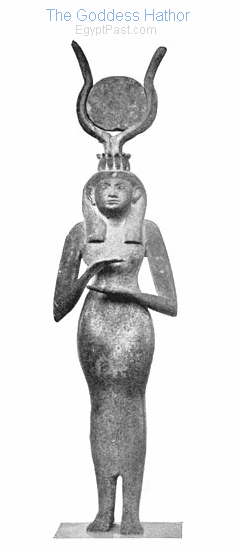Hathor

Ancient Egyptian Statue of the Goddess Hathor
Hathor was a popular Egyptian goddess worshipped throughout Egypt and even some lands adjoining Egypt. Her attributes were many, and changed over time, but primarly Hathor was regarded as a largely benevolent goddess of love, music, joy and protector of miners and women in chilbirth. She was also responsible for welcoming the dead into the afterlife. Hathor was so popular that many children were named after her, and many festivals were held in her honor every year.
The Romans identified Hathor with the goddess Venus, while the Greeks associated her with their goddess of love, Aphrodite. When the Greeks conquered Egypt, Hathor was largely adopted into the the Greek religion as an aspect of Aphrodite.
The worship of Hathor can probably be traced back to prehistorical fertility cults. She is usually depicted as a woman with cow horns, but in some paintings and engravings she is depicted as a sky-goddess, also sometimes called the "Lady of the Sycamore" in her capacity as a tree deity.
Originally, Egyptian beliefs about the afterlife held that the righteous dead (male and female) would be reborn as an Osiris, but later Egytptians came to believe that morally worthy men would be reborn as Osiris and morally worthy women would be reborn as Hathor.
Hathor's standing within the pantheon of the Egyptian gods was confusing and relationship with the other god changed over time, with often contradictory or paradoxical results. This shifting of Hathor's position within the family of gods was due in part to the fact that local cults, though devoted to the same deity, often had unorthodox beliefs, but was also due to the Egyptian mythological and world view: contradictions were not seen as problematic, but merely revelations of different layers of truth. Thus all versions of Hathor's lineage and role in the cosmos were seen as equally true.
In various myths Hathor was either the mother, daughter or wife of Ra and, like Isis, is at times described as the mother of Horus. And despite being a benevolent god, Hathor was also (in one of her many aspects) Sekhmet (war goddess of Upper Egypt), who was so angered by a human plot to assassinate Ra (in one of the legends) that she became intent on slaughtering all of humanity. She was only stopped by Ra himself who tricked Hathor.Sekhmet by pouring blood colored beer onto the ground so that she drank so much of it, thinking that it was human blood, that she became sated.
The many contradictions in the Hathor myth, none of which troubled the Egyptians who worshipped her, may provide an insight into their world view, and the Egyptian's ability to accept paradoxes or illogical conclusions not as proof of error, but simply as complementary and simultaneously aspects of reality.
pyramids Egypt Mummies Search Engines Link Report
Egyptian Cities | Egyptian Education | Ancient Egypt | egyptian clothing | Egyptian Houses | The Egyptians | Egyptian Family Life | Egypt and its Neighbours | Government in Ancient Egypt | Egyptian History | Military | Organization of Ancient Egypt | Recreation | Egyptian Religion | Pyramids | About | Privacy Policy | Site News | Site Map
EgyptPast.com - Facts and Information About the History of Ancient Egypt
-